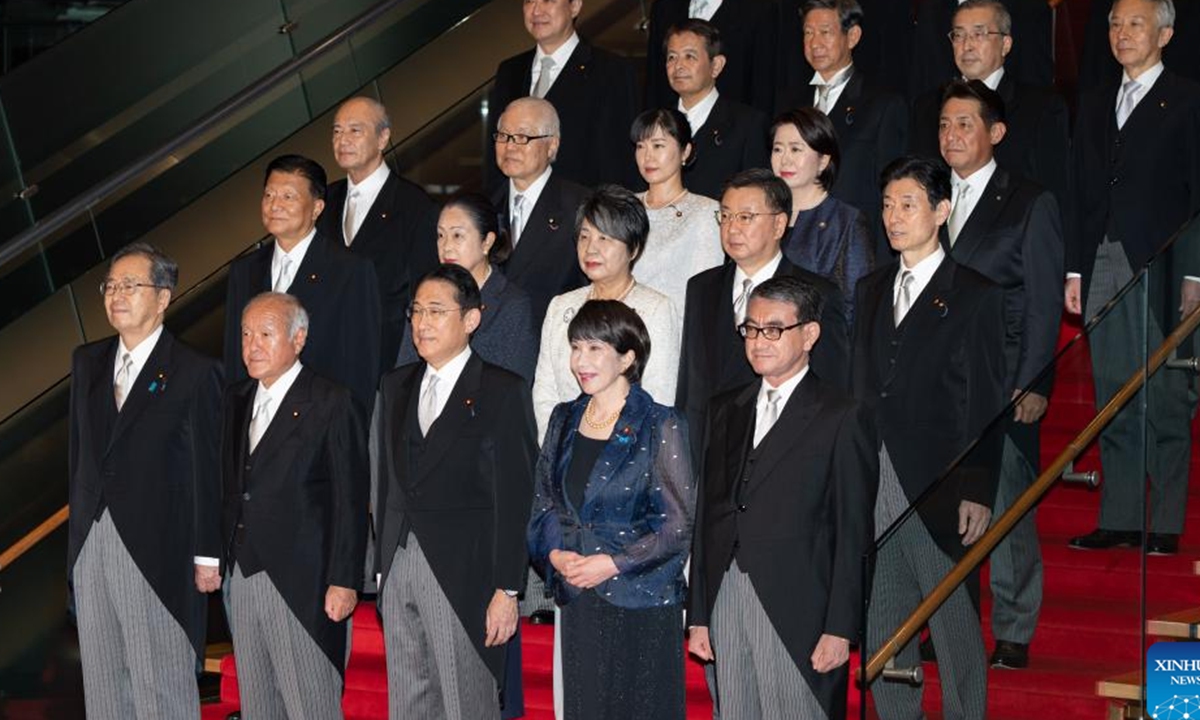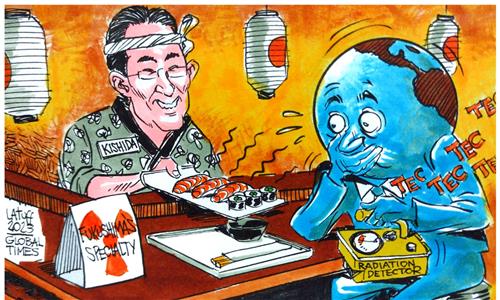Tokyo names ‘pro-Taiwan’ defense minister, reportedly appoints serving official to Taipei, facing backlash from Beijing

Japanese Prime Minister Fumio Kishida poses for group photos with his cabinet members at the prime minister's official residence in Tokyo, Japan, September 13, 2023.Photo: Xinhua
Tokyo made two dangerous moves on Wednesday on the Taiwan question - one was naming a "pro-Taiwan" politician as the country's new defense minister in Japanese Prime Minister Fumio Kishida's cabinet reshuffle, the other is reportedly appointing a serving government official to act as its de facto defense attaché to the island of Taiwan, which Chinese observers warned would further erode the foundation of China-Japan ties and will face a backlash from China.Observers believe that Kishida's cabinet reshuffle signals the Japanese leader has no willingness to repair ties with Beijing, instead there will be more obstacles in future exchanges between the two neighbors. Japan is getting more wanton and aggressive in challenging the one-China principle and it must face consequences for its out-of-line move on the Taiwan question, observers warned.
According to Japanese media outlet Mainichi Shimbun, on Wednesday, Kishida reshuffled his cabinet, hoping the revamp will give a boost to his administration, paving the way for his Liberal Democratic Party (LDP) to emerge victorious from the next House of Representatives election and strengthening support from within his party before the LDP presidential race in 2024.
Out of 19 ministers, Kishida selected 11 new faces. Among the more stunning moves was Kishida's decision to have former Justice Minister Yoko Kamikawa replace Yoshimasa Hayashi, a close ally of Kishida, as foreign minister. Former Justice Minister Yoko Kamikawa, 70, a veteran female lawmaker, was named foreign minister, the Japan Times reported.
Hayashi, a "China school" Japanese politician, is experienced in exchanges with China, said Lü Chao, the director of Institute of US and East Asian Studies under Liaoning University.
However, Kamikawa, who held the justice portfolio twice under former Prime Minister Shinzo Abe, and then again between 2020 and 2021, has little experience in diplomacy, according to Japanese media.
Kishida tapped Minoru Kihara, 54, a onetime aide to former prime ministers Shinzo Abe and Yoshihide Suga, to be defense minister, replacing Yasukazu Hamada. Kihara is a senior member of a bipartisan group aimed at promoting "ties with the island of Taiwan."
Kihara is infamous for supporting the constitutional amendment and the prime minister's direct visit to the Yasukuni Shrine which enshrines Japan's Class-A war criminals who symbolize Japan's war atrocities and militarism during World War II.
As Kishida has tapped more hawks as cabinet members, the new cabinet is very likely to create more obstacles in ties between China and Japan. Kishida showed no intention to reverse tensions with China at a time when China has lambasted Japan's dumping of nuclear-contaminated wastewater from the crippled Fukushima nuclear power plant into the Pacific Ocean, Lü said.
Through the reshuffle, Kishida is trying to gain backing from conservatives, who have traditionally put more emphasis on relations with the US than with China, Lü Yaodong, a researcher at the Institute of Japanese Studies at the Chinese Academy of Social Sciences, told the Global Times on Wednesday.
On the same day, Japan appointed a serving government official to act as its de facto defense attaché in Taiwan island, Reuters cited four sources as saying, noting that elevating security ties with the island would anger the Chinese mainland.
According to Reuters, Japan does not have any formal diplomatic representation in Taiwan, and instead handles bilateral relations through the Japan-Taiwan Exchange Association in Taipei, which is chiefly staffed by reassigned foreign and trade ministry officials. The defense attaché role, however, has until now been held by a retired Japan Self Defense Force officer to avoid antagonizing China.
He has been joined by an official dispatched by the defense ministry to enhance information gathering and communicate with Taiwan regional forces, said the sources, the Reuters reported.
It would undoubtedly constitute a serious incident, leading to a new escalation of tensions between China and Japan, and China is bound to take countering move, Chinese observers warned.
Chen Binhua, a spokesperson for the Taiwan Affairs Office of the State Council, said on Wednesday that the mainland is firmly opposed to any countries that already have diplomatic relations with China conducting official exchanges with China's Taiwan region.
China urges Japan to abide by the one-China principle and the four political documents between China and Japan, and to be prudent about their words and deeds on the Taiwan question, Chen stated.
Japan has increasingly become the most rampant external force intervening in the Taiwan question, getting more closely aligned with the US, which will certainly trigger a spiral escalation of China-Japan frictions, Lü Chao said.
In the Asia-Pacific region, China should in particular be vigilant over Japan's moves especially around the Taiwan question as Tokyo will be a more aggressive bully under the protection of Washington, the expert stressed, warning of the perception that "a Taiwan emergency is a Japanese emergency" has become a consensus within the Japanese government.
"If Japan violates the core interests of the Chinese people, we must resolutely counter back," Lü Chao noted.


